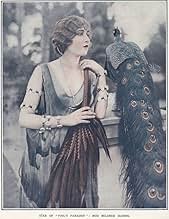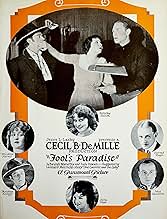Aggiungi una trama nella tua linguaIn a Mexican border town Arthur befriends cantina girl Poll. She falls for him but he still loves the dancer Rosa. When the cigar Poll gives him explodes and blinds him, Arthur is duped into... Leggi tuttoIn a Mexican border town Arthur befriends cantina girl Poll. She falls for him but he still loves the dancer Rosa. When the cigar Poll gives him explodes and blinds him, Arthur is duped into thinking Poll is Rosa and marries her. When his vision is surgically restored, he leaves ... Leggi tuttoIn a Mexican border town Arthur befriends cantina girl Poll. She falls for him but he still loves the dancer Rosa. When the cigar Poll gives him explodes and blinds him, Arthur is duped into thinking Poll is Rosa and marries her. When his vision is surgically restored, he leaves for Siam to find Rosa.
- Regia
- Sceneggiatura
- Star
- Child
- (non citato nei titoli originali)
- Man talking to Arthur while Poll plays Rosa Duchene
- (non citato nei titoli originali)
- Child
- (non citato nei titoli originali)
Recensioni in evidenza
I don't know, but it's one thing to begin one's career with some striking artistic effects, to make one's mark on Hollywood--much like he had Sessue Hayakawa brand Fannie Ward in "The Cheat" (1915)--and another thing when we're talking about the subsequent DeMille, the profitable producer who made films all the way to "The Ten Commandments" in 1956. "Sunset Boulevard" (1950) put it in stark relief--that the other great Hollywood silent film directors didn't make it that far. D. W. Griffith and Erich von Stroheim were kicked out before the end of the 1920s. Buster Keaton was eaten by the moneymen, too, Charlie Chaplin was exiled, and female filmmakers like Lois Weber were marginalized. Perhaps, the only director beginning in the 1910s to have a more impressive streak of longevity in the studio system, because he on the other hand maintained a sense of prestigious artistry, was Ernst Lubitsch (which also explains why his sex comedies are better than DeMille's). When one goes from, say, the experimental psychological examination by superimpositions in "The Whispering Chorus" (1918), continues with flashes of brilliance as in his believed uncredited direction of "Chicago" (1927), and winds up with the hallow mundanity of "The Greatest Show on Earth" (1952), it figures that at some point, or rather at a series of points, he sold out. Never mind his political conservatism, it's the increasingly artistic conservatism of it. And, it's as though we're seeing that process reflexively playing out in "Fool's Paradise."
Nagel's character is already half-blinded, either figuratively or literally, by the concurrent WWI and the introduction to his obsession with a French dancer, as portrayed by Harris. He entirely loses his sight with an explosion both literal and of the stage extravaganza of special effects in the play-within-the-play, an adaptation of Hans Christian Andersen's "The Snow Queen" fairy tale. This is clever; he literally cannot see how he is manipulated by art and so both thinks he actually loves the actress and fancies himself a poet, too, by writing unpublishable sappy love letters in her honor.
When he regains his sight, art and life, the stage and the spectator, have merged in an extended episode of Orientalism in Siam, where he doesn't so much deconstruct a temple setting, let alone with an awful depiction of "Living Sacrifice to Living Reptiles" Buddhism, but the artifice of Harris's dancer. The doubles theme is complete when he sees the image of the real woman, of Dalton's character, superimposed over that of the woman of the stage. The irony, though, is that DeMille and company utterly muck up this point by ultimately favoring a last-minute evangelical pitch. "But the ONE who sees Everything--always gives his Blind Children one more chance, to come up into the Light." In the movie, the man now sees, but in real life and in a figurative sense, DeMille went blind. The tragedy is that his true love was right in front of him, too.
DeMille ultimately succumbing to bigotry, faux religiosity, absurd spectacle and prolonged melodrama, the true film here was in that shack in the regions of El Paso amidst an oil boom, Nagel as blind and Dalton playing off the mistaken identity of her originally mocking imitation of the the Snow Queen, pretending to be the actress. The combination of guilt, pity, sacrifice and love in conjunction with the artistic reflexivity works. Nagel plays blind in the usually inept manner of looking over and past people, but Dalton is impressive. Harris is amusing in a supporting role of making fun of vacuous artists and of the French, the only stereotype in the film (and there are a lot of them) that doesn't entirely come across as obscene nowadays. But, Dalton anchors this. If there were Oscars back then, I'd say to at least give her a nomination. And, credit to DeMille, too. I especially love how he darkened the background for when Nagel's sight is restored; it recalls his pioneering of low-key lighting in "The Cheat." And, boy, that burning house scene is a standout.
Without Dalton and when Nagel sees even before he loses and regains it, the picture tends to suffer. It begins by making fun of an African-American family attaining wealth from an oil discovery, although the same sort of good fortune will be treated with all melodramatic earnestness when it happens to our white protagonist. Then, there's the knife-tossing, tavern gangster of a depiction of a Mexican, Roderiguez, as played by Russian Theodore Kosloff. And, that's all before the jaw-dropping textbook case of othering in the depiction of Siam (the textbook, by the way and so to speak, being Edward Said's "Orientalism").
At first glance wildly plotted, "Fool's Paradise" may be the most DeMille film I've yet seen, the most of all the various facets of the filmmaker. It's maybe his best work since his also racially-charged "The Cheat," and more clearly than in some of the other early efforts indicative of the direction of pseudo-reverent spectacle he'd follow from the campy "The Godless Girl" to the pageantry of "The Ten Commandments" films (1923 and 1956). In the end, he may've found himself a failed poet and the artistic dance to oft be an empty spectacle for idolatry, imitation and masquerade, but it was a compelling fairy tale while it lasted.
(Note: There's a nice reflection shot, too, with a superimposed image as Dalton burns other images and the entire house down but not before looking at herself and her prospects in the mirror.)
It's a fine print from the Library of Congress, as well, with a score from Neil Brand provided for the festival. I especially hope this one makes it to home video someday--perhaps a reboot of a professionally-done collection of DeMille silents and, as well, early talkies, if that's not too greedy, is in order.
Are you following this? Because the overwritten titles don't help much either. And it gets even worse, with sacred crocodiles almost devouring Mlle Harris' glove, and Nagel, too. Demille occasionally went over the top -- anyone who has seen MADAME SATAN will agree with that. However this cast can't handle that sort of ridiculousness, although Miss Dalton makes a try. If you're like me, you won't let that deter you from seeing this -- it is Demille. But be forewarned.
When all else fails, DeMille builds over-the-top spectacle to distract from the weak story line and to pad the film and make it longer than it needs to be.
The only saving grace here is Conrad Nagel's underacting. DeMille had a penchant for these exotic female types which he assumes allows the likes of Harris and Dalton to ham it up with every gesture prolonged and exaggerated.
WOOF WHAT A DOG!
Lo sapevi?
- QuizPreserved at the Library of Congress.
- ConnessioniFeatured in Charlie: The Life and Art of Charles Chaplin (2003)
I più visti
Dettagli
- Tempo di esecuzione
- 1h 49min(109 min)
- Colore
- Mix di suoni
- Proporzioni
- 1.33 : 1
































